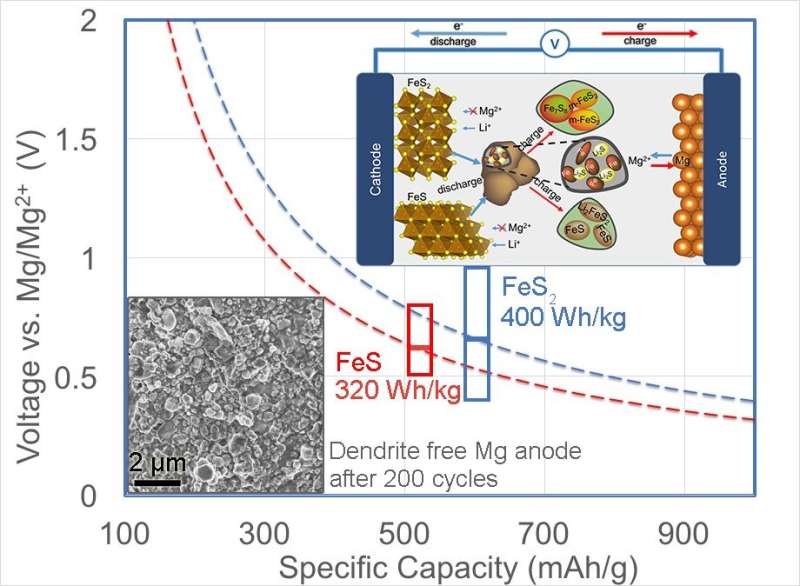More research needed to correct the paradox of sustainable batteries

Electric vehicles, powered by renewable energy instead of finite fossil fuels, are the best green choice—but they could be more sustainable. The most common power source in electric vehicles and portable electronics, lithium-ion batteries rely on an expensive and scarce metal to work. To spur more research into a more abundant and much cheaper alternative, magnesium, researchers in China assessed the current state of research and offered potential paths forward to achieve more sustainable batteries.
They published their work on Jan. 4 in Energy Material Advances.
"The development of cost-effective and high-performance batteries is imperative," said paper author Chilin Li, professor with the State Key Laboratory of High-Performance Ceramics and Superfine Microstructure, Shanghai Institute of Ceramics, Chinese Academy of Sciences (CAS). "Currently, lithium-ion batteries still occupy most of the market, but they are limited both in lithium as a resource and in their energy density."
Li explained that magnesium has several significant advantages as an alternative to lithium, especially to comprise a battery's anode, which is responsible for discharging energy to a device.
"Magnesium is the fifth most abundant metal in Earth's crust, and it costs less than 1/30th that of lithium, with excellent operation safety and smooth deposition morphology," Li said. "Magnesium metal batteries are attractive candidates for large-scale energy storage systems largely due to their high volume energy density, which is estimated to exceed that of lithium-ion batteries.
But magnesium cannot simply be swapped with lithium to make an ideal battery. According to Li, the challenge is two-fold. Magnesium as a metal anode is incompatible with most electrolytes. Since batteries recharge and discharge power through the interactions of their cathode, anode and electrolyte, mismatched materials render the unit useless. The second issue is also part of what magnesium is appealing: its high charge density. While a positive feature in terms of power, in technical processes, high charge density requires a higher energy to achieve dissolution and diffusion of cations, so the charge-discharge cycle takes longer.
Rather than swapping one material for the other, Li said the most promise comes from treating the magnesium metal with lithium ions to make a hybrid battery. The approach limits use of a nonrenewable resource, but still makes use of its desired properties. The idea has been originated in the early 2000s, but the steps to the perfected battery have been incremental. Li and his team reviewed the latest works, comparing the energy and power densities of proposed magnesium-lithium batteries to identify areas in which future research should focus.
"Magnesium-lithium hybrid batteries can combine the advantages of lithium and magnesium to achieve fast electrode kinetics and smooth anode deposition morphology," Li said. "In this paper, we illustrated recent research exploring the contributions lithium makes to improve the electrochemical performance of magnesium-based cathodes and anodes. Our aim is to provide inspiration for future research in the field."
"We surmised that, to achieve high theoretical values in magnesium-lithium hybrid battery configurations, the electrolyte must have high ion conductivity and a wide electrochemical window," Li said.
The researchers determined the best performing hybrid battery configurations must have high ion conductivity and a wide electrochemical window. To achieve these, Li said, the development of a stable and practical electrolyte and a magnesium anode, a well-designed cathode with improved structure to facilitate better diffusion kinetics, sufficient conductive wiring and a better rate performance should all be research goals.
"Lithium-ion batteries have been commercialized for decades, but, after a considerable amount of research, their energy density is likely not going to increase, nor will lithium become more abundant," Li said. "To advance the field, we're turning to magnesium-lithium hybrid batteries. The research is still in its infancy and significant investigations are still required to realize the practical applications."
More information: Yajie Li et al, Mg-Li Hybrid Batteries: The Combination of Fast Kinetics and Reduced Overpotential, Energy Material Advances (2022). DOI: 10.34133/2022/9840837

















